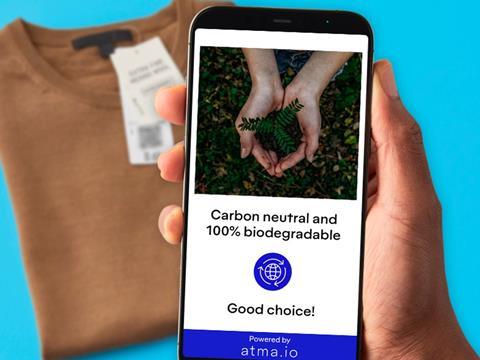
Avery Dennison has today announced that it will partner with the HBAR Foundation and incorporate Hedera’s distributed ledger technology (DLT) into the atma.io connected product cloud, allowing customers to account for carbon emissions on unique items through tokenization.
According to Avery Dennison, atma.io will scale beyond traditional supply chain events to account for carbon emissions at a granular level using the Hedera Consensus Service (HCS) and Hedera Token Service (HTS). In addition, atma.io will incorporate the Guardian solution, an open-source tokenisation service that the companies say makes creating and discovering Environmental, Social and Governance (ESG) assets easier.
Avery Dennison says that these additions to the atma.io platform will allow customers across numerous verticals to account for their emissions and enable carbon reductions. The company adds that the partnership offers customers more granular carbon accounting, tokenization of their carbon footprint, and the ability to have highly credible carbon reduction tokens to help meet net-zero emissions targets.
Max Winograd, vice president of connected products at Avery Dennison Smartrac and co-founder of atma.io, comments: “In the year since our launch of atma.io, we’ve seen strong adoption by brands across numerous industries - from apparel to food, beauty, retail, pharmaceuticals, and more.
“They all need end-to-end supply chain traceability, carbon accounting, and carbon reduction capabilities to allow them to deliver on their net-zero carbon goals and give their consumers the product transparency they demand.
“We’re excited to start pushing billions of item-level data transactions through the Hedera network to deepen the connection between physical and digital worlds, and enable our customers to continue leading in sustainability and traceability.”
Brett McDowell, chair of the Hedera Governing Council, adds: “Avery Dennison is emerging as a global leader in sustainability, and the evolution of atma.io is helping them in turn enable their customers to deliver on their sustainability and circularity goals. Their understanding of the sustainability and traceability benefits that distributed ledger technology can bring to supply chains has deepened incredibly during their time as a member of the Hedera Governing Council.
“And now, their customers will not only have access to a source of single truth, where a product’s origins and entire journey can be chronicled and made available to brands, retailers, and consumers, but will also have the ability to manage emissions and highlight their sustainability directly in the connected product cloud.”
Shayne Higdon, CEO and co-founder of the HBAR Foundation, concludes: “Avery Dennison and atma.io’s leadership in enabling granular carbon emissions accounting, along with their wider sustainability initiatives to provide customers a path to net-zero emissions, is a major step forward for the entire industry.
“atma.io’s adoption of carbon emissions tokens on Hedera, and the ability to access verified carbon reductions will enable companies to prove their claims with full transparency of the data and actors involved.”
Over 22 billion items are reportedly managed by the atma.io platform across the apparel, retail, food, and healthcare segments. The latest addition to the platform builds on Avery Dennison’s Spring 2022 release, which included Real-time Carbon Impact Analytics, the Sustainability Facility Assessments feature, and the Real-Time Waste Elimination Tool.
Avery Dennison explains that the Spring 2022 updates can provide brands using atma.io with data-driven insights into the carbon footprint of their products, including Scope 3 emissions, and artificial intelligence and machine learning to analyse anomalies and inefficacies across the supply chain.
The new carbon emission tokens and carbon reduction tokens will be available for atma.io customers beginning June 2022.














No comments yet